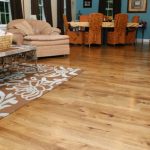Hickory is often brought up in conversations about hardwood flooring because of its reputation for strength and bold appearance. It’s not as commonly used as oak or maple, but that doesn’t mean it’s not a great option. In fact, hickory offers a unique set of qualities that can make it an excellent choice depending on your home’s style, your lifestyle, and your long-term flooring goals. This article breaks down the real pros and cons of hickory hardwood to help you decide if it’s the right fit for your floors.

Durability That Stands Out
Hickory is one of the hardest domestic hardwoods available in North America. It scores high on the Janka hardness scale, which means it’s tough and resistant to scratches and dents. If you have a busy household with kids, pets, or high foot traffic, this extra durability can really pay off. Compared to softer woods, hickory can handle everyday wear much better and still look good for years.
Bold Grain and Color Variation
One thing that really makes hickory stand out is its dramatic grain and color patterns. It features a mix of light and dark streaks, which creates a rustic and dynamic look. This isn’t the type of floor you pick if you want something subtle—it draws attention and gives character to a space. For homes with a farmhouse, cabin, or country aesthetic, hickory fits in naturally. If you’re into modern design, it can still work, but you’ll want to balance the bold grain with more neutral furniture and decor.
Maintenance and Cleaning
Even though hickory is tough, it still needs regular cleaning to stay in good shape. Like any hardwood, it’s sensitive to moisture and should be kept dry. Sweeping and vacuuming regularly helps keep dust and debris from scratching the surface. It’s also a good idea to use rugs in high-traffic areas to protect the finish. Hickory doesn’t need any special treatment, but keeping up with basic maintenance will keep it looking great.
Cost Considerations
Hickory hardwood is generally more expensive than oak or other common options. The cost comes from both the raw material and the milling process, as hickory’s hardness can make it more difficult to cut and shape. That said, it’s a long-lasting floor, so the higher upfront price can be worth it in the long run. If you’re on a tight budget, it may not be the best fit, but if you’re looking for value over time, it’s worth considering.
Availability and Installation
Hickory is available in both solid and engineered hardwood forms. Because it’s so dense, solid hickory can be harder to install, especially for DIY projects. It requires sharp tools and a bit of experience to get a clean, professional look. Engineered hickory is a little easier to work with and can be installed in more types of spaces, including basements. Be sure to use a qualified installer if you want the best results with solid hickory.
Is Hickory Right for You?
Whether hickory is a good hardwood flooring choice really depends on what you’re looking for. If durability and bold style are high on your list, then it’s a great match. It may not be ideal if you prefer uniform grain or need a more budget-friendly option. Still, for homeowners who want a unique and strong hardwood floor that will hold up over time, hickory is absolutely worth a look.




